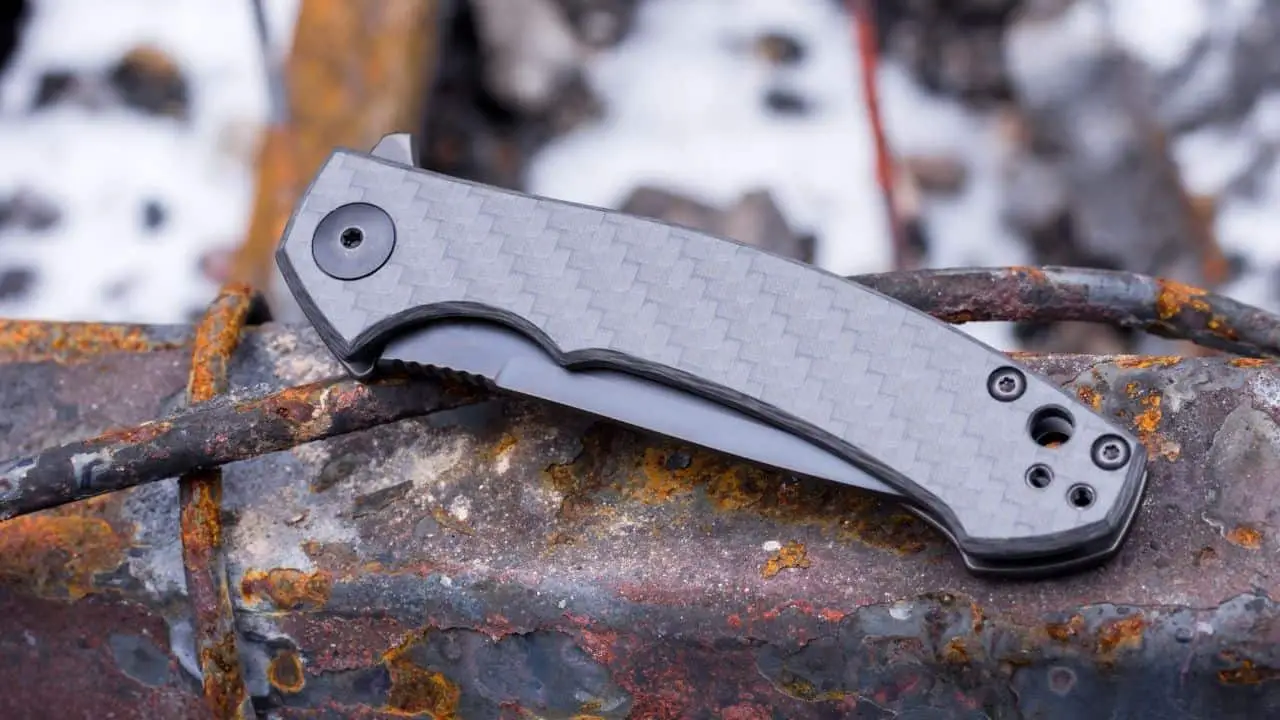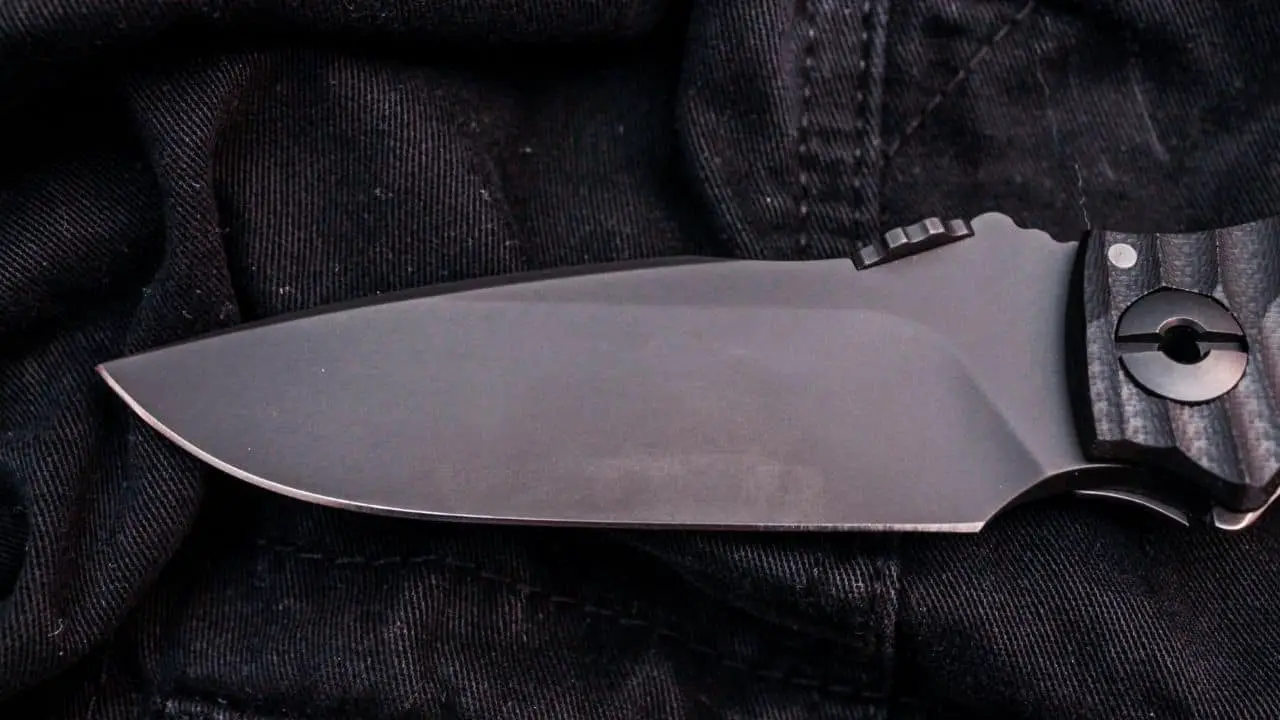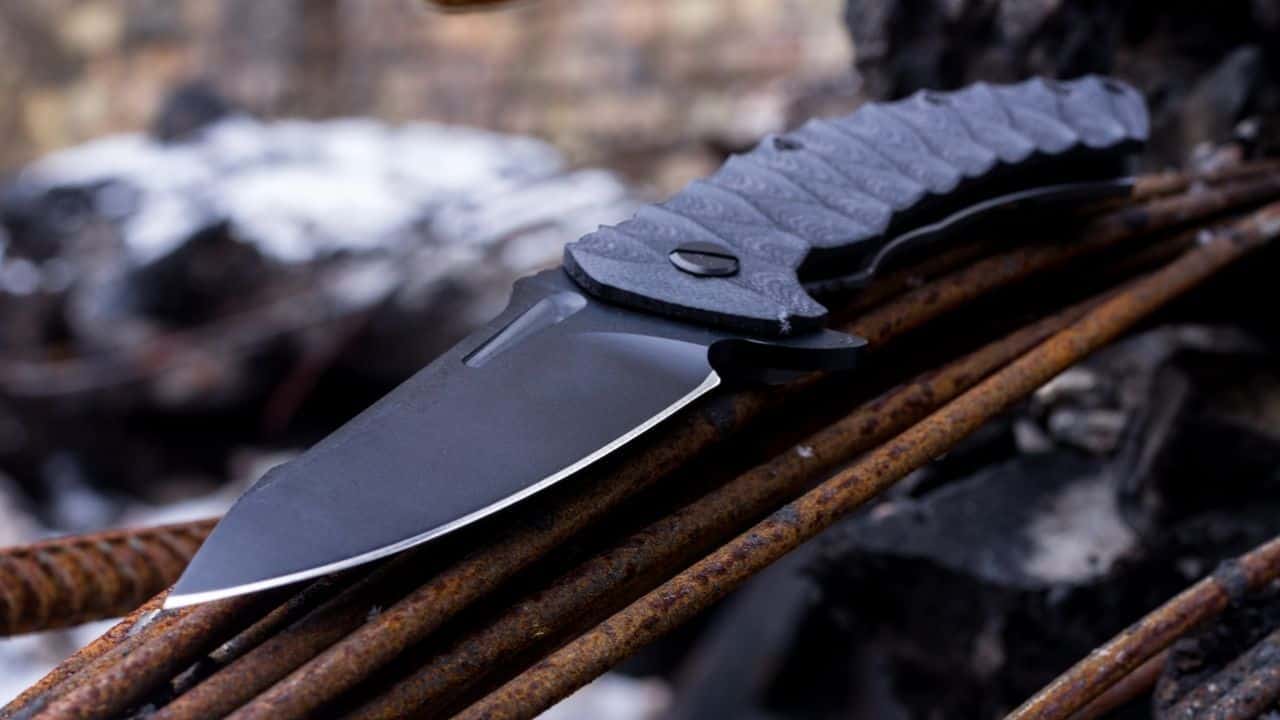Knives can be made of a variety of different steels and materials, and sometimes it can be challenging to know which ones are good and which you should avoid if possible. One of the more unique and fascinating materials sometimes used to make knives is titanium. But are titanium knives actually good, or is the material only used in knives as a marketing buzzword?
Titanium alloy is a very strong material commonly used in knives. While it’s much harder than most steels, titanium alloy can be quite brittle and doesn’t hold an edge very well. Titanium alloy has many downsides, but its great corrosion resistance and hardness makes it a popular knife material.
Titanium is one of those materials often regarded as being nearly indestructible and usually used as a marketing gimmick. While there is some truth to many of the claims made for titanium, there is more to the story than many knife manufacturers usually let on.
Knife manufacturers use titanium alloys to make up many knives and knife parts. Everything from a knife’s blade to its finish can be titanium alloy or plating. Let’s take a very in-depth look at titanium knives and see whether they are actually good or not.
Table of Contents
Are Titanium Knives Good?

Titanium by itself is a very strong material, but it’s also quite soft and would be utterly useless if used to make a knife. Instead of using pure titanium, knife makers use titanium alloys to construct their titanium knives and parts.
Metal alloys are mixtures of different metallic elements to create a material with more desirable qualities such as heightened strength or corrosion resistance.
are mixtures of different metallic elements to create a material with more desirable qualities such as heightened strength or corrosion resistance.
There are MANY different titanium alloys with varying characteristics and qualities. However, for this article, I’ll be addressing the basic qualities possessed by most titanium alloys used to make knives today.
Unless you spend a lot of time looking at knife steels and materials, it can be challenging to separate the marketing from the facts. Titanium is a sort of buzzword to many new knife owners because it sounds a little futuristic and is known to be extremely strong.
Let’s take a look at the real benefits and drawbacks of titanium knives.
Benefits of Titanium Knives
Titanium alloys have many great qualities and attributes that make them ideal for knife blades and other knife parts.
Below are a few of the most significant benefits of titanium knives:
- Titanium knives are extremely corrosion resistant and great for wet environments and for people who forget to keep their blades dry.
- Titanium is a very tough and hard metal that’s nearly impossible to dent or scratch.
- Titanium has a very low density, which makes it super lightweight and perfect for knives that you’re going to carry a lot.
As mentioned above, titanium is exceptionally resistant to corrosion and rust. Rust is a huge issue that can absolutely destroy your knife beyond repair, so having your knife made out of a rust-resistant material relieves that stress and responsibility.
Of course, you should still keep your titanium knife clean and dry as much as possible, but it can allow you to focus more on the task at hand and worry less about your tool’s long-term survival.
Titanium is an extremely hard and tough metal. Many titanium alloys specifically created for knives take this to a whole new level and are EXTREMELY hard. There are a few downsides and things that you should consider regarding the hardness of titanium, but I’ll discuss that in more detail in the next section.
In addition to all of the other outstanding characteristics of titanium I’ve already listed off, titanium is also super lightweight. For its strength and durability, titanium has a pretty insanely low density.
Having a low-density knife material usually means giving up a lot of durability and strength, but the strength tradeoff with titanium is pretty minimal. A lightweight and robust knife made of titanium is excellent for blades you carry around with you a lot or for hiking when every ounce counts.
Drawbacks of Titanium Knives
While there’s a lot to like about titanium knives, as demonstrated above, there are also a few drawbacks that are important to consider.
Below are a few of the primary downsides of titanium knives that you should keep in mind before getting one:
- While titanium is very strong and hard, its rigidness can cause it to become brittle and snap under pressure.
- Titanium is difficult to sharpen, and if you manage to sharpen it, it doesn’t maintain an edge for very long.
- Titanium is often quite expensive and challenging to work with, increasing the price of knives made out of this material.
While titanium is super hard and strong, it can become quite brittle and susceptible to snapping and chipping. Many titanium alloys try to assess this common issue by adding elements to increase titanium’s strength and durability, but titanium’s brittleness is always present to some degree.
For most people, the brittle concern with titanium will not be a problem at all. As long as you get a knife made out of a quality titanium alloy, use your knife correctly, and don’t try to use our blade to pry or bend things, you should pretty much avoid any brittle concerns with your blade material.
Sharpening titanium knives can sometimes be a real pain, especially if you don’t like sharpening or haven’t practiced as much as you would’ve liked. Usually, most people opt to get their titanium knives professionally sharpened every once in a while and only do touchup sharpening when needed.
Titanium is far from the easiest material to sharpen, but with a little bit of stubbornness, patience, and time, you could sharpen your own titanium knife.
In addition to the cost of having your titanium knives professionally sharpened every once in a while, titanium knives themselves are often quite expensive. Titanium is quite rare and difficult to work with (hence the sharpening problem!), making knives made of titanium come with quite a hefty price tag.
A titanium knife’s price varies widely depending on the knife and how much titanium the knife contains. However, it’s definitely something to keep in mind when assessing the downsides to titanium knives.
Is Titanium a Good Material for Knife Blades?

Here’s a quick overview of the primary pros and cons of titanium as a knife blade material:
Pros:
- Corrosion-resistant
- Strong and hard
- Looks very sleek and nice
- Lightweight
Cons:
- Brittle
- Difficult to sharpen
- It doesn’t hold an edge very well
Knifemakers and manufacturers often use titanium as a blade material due to its extreme hardness. Its corrosion resistance, extreme strength, and low density also make it very preferable and sought after.
While there are many good qualities and things that make titanium alloy a suitable choice for knife blades, there are often more downsides than benefits for using the material as a blade. Let’s break it down.
As I went over in previous sections, titanium has many good qualities that make it appealing and commonly used in knives. However, many of titanium’s weaknesses directly contradict what you often want and expect from a knife blade steel.
Titanium is often brittle, difficult to sharpen, and doesn’t hold an edge very well. Not qualities that you usually want a blade steel to possess, right? Many titanium alloys attempt to address these shortcomings, but in my personal opinion, none are quite to the level of many carbon and stainless steels.
Titanium definitely still has a place in certain knife blades and other knife parts, though.
Decorative knives, diving knives, and knives that you don’t intend to use very often can look and work great with a titanium alloy blade. You can even make a titanium alloy blade work on an everyday carry or survival knife if you’re willing to put in the work and take your chances with its slight brittleness.
The hard truth, though, is that titanium doesn’t make a tremendous general knife blade. Instead, titanium is better suited for knife scales, handles, and coatings, which I’ll discuss more in the following sections.
Is Titanium a Good Material for Knife Scales?
Here’s a quick overview of the pros and cons of using titanium to construct knife scales:
Pros:
- Looks very minimalistic and clean
- Resistant to wear
- Difficult to scratch
- It can come in many patterns and looks
Cons:
- Often quite pricey
When it comes to using titanium in knives, titanium scales are some of the best ways to use the material. For most people, there are literally no downsides to titanium knife scales or handles.
Just for reference, check out this article for a full explanation of what knife scales are (the short version is that knife scales are the slab of material that sandwich the knife tang on many knives to form the handle).
(the short version is that knife scales are the slab of material that sandwich the knife tang on many knives to form the handle).
The only possible downside to titanium knife scales that I can think of, besides the obvious personal preference, is the price. Titanium alloy can be quite expensive, but there are so many benefits to having your knife scales made from it that many knife enthusiasts don’t even second guess the price.
Titanium knife scales are excellent because they are incredibly resistant to wear and tear and are nearly impossible to scratch. There are many ways titanium can be integrated into a knife’s scales, so some titanium scales can be more susceptible to damage if the titanium layer is very thin.
But overall, titanium alloys are very durable and resistant to wear, so titanium scales are often a solid and reliable choice.
Another great benefit to titanium knife scales is their minimalistic and unique look. Knife scales come in all shapes, sizes, and designs, and that includes titanium scales. There are so many unique and beautiful ways that titanium can be used to create genuinely stunning knife handles.
Titanium is one of those materials that can take on many different looks and patterns and always look very beautiful and classy. There is almost no way to go wrong with titanium knife scales because of their excellent wear resistance and modern, sleek look that works well on nearly any knife.
Is Titanium a Good Material for Knife Coatings?

Here’s a brief overview of the benefits and disadvantages of titanium knife coatings:
Pros:
- Protects against corrosion and rust
- It’s very sleek and minimalistic
- It can make cleaning your knife easier
Cons:
- Usually costs more
- It can create “drag” on the blade
- It’s sometimes just a marketing gimmick
Knife coatings are nothing new and have been quite popular for their protective qualities and aesthetic looks. There are many different types of knife coatings and finishes, and many of them contain titanium.
You can find titanium coatings on a wide variety of knife designs and price points, but it is especially popular on mid to high-tier folding knives and everyday carry blades. There are many great benefits to titanium coatings, such as increased corrosion resistance and easier cleaning of the blade.
Titanium coatings also give the knife a very sleek and modern look. The finishes often are matte gray, which is a very desirable look.
While titanium knife coatings are very desirable, sleek, and popular among knife enthusiasts, there are a few possible downsides that you should keep in mind. One of the more apparent cons of titanium coatings is their price. As the name suggests, titanium coatings often contain a pretty good amount of titanium, which can be pricey.
Some hardcore knife enthusiasts say that titanium coatings add extra “drag” to the knife blade, but nearly all coatings will do that in reality. Adding additional “drag” to a knife because of a blade coating isn’t a concern to most people, but it can be something to consider and keep in mind.
When it comes to knives, companies often use titanium as a buzzword because it sounds cool and futuristic. Many people have an association between titanium and strength, making a titanium-coated knife seem more robust and stronger than it actually is.
Sometimes, knife companies use titanium coatings as a marketing gimmick, so make sure to be aware of the real benefits and drawbacks so you can make your decision based on facts and not marketing.
Which Titanium Alloy is Best for Knives?
We’ve covered the general pros and cons of titanium as a material regarding its use in the making of knives. So let’s get a little more specific and take a look at some popular titanium alloys used for knifemaking and their benefits and downsides.
There are many titanium alloys , but which is truly the best for knives?
, but which is truly the best for knives?
The most popular and best titanium alloy for knives is Grade 5 titanium (6AL-4V). There are many varieties and variations of 6AL-4V, but its commercial availability and qualities make it ideal for knife blades and scales.
Grade 23 titanium (6AL-4V ELI) is another suitable titanium alloy for knives with improved strength over Grade 5.
Often, knife companies will simply list their titanium knives as “Ti” or “Titanium” without giving you the exact alloy used. While this can be frustrating for those of us who like to know the specifics of our blade materials, the vast majority of the time, it’s Grade 5 titanium, which is excellent for knives.
Should You Get a Titanium Knife?
Titanium is a very strong and corrosion-resistant material that many knife makers use to construct knife blades, scales, and coatings. While titanium has many qualities ideal for knifemaking, there are also quite a few downsides that are impossible to ignore.
It begs the question: should you even consider getting a titanium knife?
The answer to whether or not you should get a titanium knife is mostly up to your personal preferences and needs when it comes to knives.
Titanium alloy’s primary claim to fame is its extreme corrosion resistance and low density. These two characteristics make titanium very lightweight and unlikely to rust, two qualities that are ideal for most knives.
While this makes titanium sound like a dream knife material, its brittleness, difficulty holding an edge, and often high pricepoint are factors that can significantly influence your decision on whether or not to get a titanium knife.
When considering whether a titanium knife is right for your needs or not, it’s essential to factor in the material’s benefits and drawbacks. Think about what you’ll primarily use your knife for and whether it’ll actually benefit or be hindered by the qualities of titanium alloy.
Beyond the practicality of titanium, you should also consider your personal preferences. Titanium is a sleek and beautiful material that has a lot of visual appeals. If you value your knife’s looks, it may be worth taking on the difficulty of sharpening titanium to get a sweet-looking knife material.
Your decision really comes down to what you emphasize and value in a knife. Titanium is excellent for diving knives, knives that get wet a lot and are susceptible to rusting, and knives that don’t get used extensively.
Make sure to check out this article to see how titanium ranked among the best survival knife handle materials.
to see how titanium ranked among the best survival knife handle materials.
Overall, there are no significant flaws or qualities of titanium that should make you avoid the material. You just need to be sure you know what you’re getting into and your needs and preferences align with your blade steel’s qualities.
Below are a few great titanium knives that I think you’ll really enjoy. Make sure to check them out if you’re interested!
